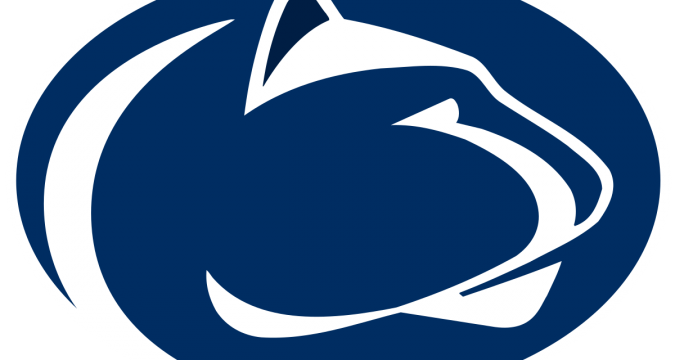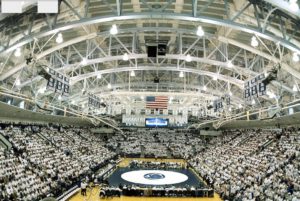
This is being written on Thanksgiving Day, November 23, 2006. I am fresh from a trip to State College and Lock Haven and the Pennsylvania State Duals. I am still trying to calm down after watching the dominating performance of the Penn State wrestling team. This is my essay on what Penn State wrestling means to me.
Thank you, Earl Cole, Clyde Frantz, and Homer Barr. Thank you, Tommy Teagarden, John Fritz, Jerry Villecco, Charlie Getty, Andy Matter, Ira Lubert, and Dave Joyner. Thank you, Rich Lorenzo and Bill Koll. Thank you, every Penn State coach and wrestler before and since. Thank you, all and every other person associated with wrestling in the state of Pennsylvania and at Penn State University. You are all part of what Penn State wrestling means to me. I am privileged to be part of the “we”, when we say “We are Penn State!” And I am privileged to be in this company. Please allow me to explain in detail why Penn State wrestling means so much to me.
My first experience with Penn State wrestling occurred 400 miles away from Happy Valley, in 1969 in Amherst, Massachusetts. I was on the main campus of the University of Massachusetts for a high-school wrestling tournament. UMass, by the way, was where I was supposed to go for my college education, being a Massachusetts native and all, and Amherst being only 68 miles away from my hometown of Pittsfield. My mother liked that a lot—the fact that when I went to college, I would only be an hour-and-a-half away. Apron strings, you know.
UMass used to have an excellent wrestling program, which now no longer exists as the result of Title IX. Its excellence then was attributable to the head coach of the their wrestling team at the time. His name was Homer Barr. Every Christmas Coach Barr ran a high-school invitational tournament. The top 15 or 20 high school wrestling teams from around the state would be invited to the UMass campus. It was not only an honor and a privilege for a team to be invited, it was an opportunity. The absolute best wrestlers in the state were there. The competition was as fierce as at the state tournament. If a wrestler won or placed, he was considered among the best, not only in the state, but also in New England. My high-school team was invited each year I wrestled. I was lucky enough to win my weight class in my junior and senior years.
I was already becoming a fan of Pennsylvania wrestling as I had observed first-hand the quality of high-school wrestlers coming out of this state. In 1969, my first year of high school, a fellow named Earl Cole came to Longmeadow, Massachusetts as a high-school sophomore when his family moved here from Pennsylvania. He proceeded to reel off three straight undefeated seasons and three state high-school championships, seemingly with ease. I thought, they must start ’em early and teach ’em well in that state. Little did I know.
At the Christmas tournaments, Coach Barr would always toot the Pennsylvania and Penn State horns. Earl Cole provided a real life example that I actually watched live and knocked heads with. He was one weight class above me, but I often got bumped up to wrestle him. Watching and wrestling him and listening to Coach Barr caused me to explore Penn State as a college choice. I began to follow Penn State athletics, particularly the wrestling team. That is how I learned about Clyde Frantz.
1969 was not only my first year of high-school wrestling, it was the year Clyde Frantz started at Penn State, wrestling at 145 pounds. As I began to follow Penn State wrestling, I kept my eye closely on him. He had a great year and placed third in the Nationals. I was blown away with Clyde’s individual performance during the year, and the intestinal fortitude he showed at the national tournament after a loss. As an aside, this kind of fortitude seems to be a Penn State tradition. As another example, does anyone recall the most awesome performance of John Lange, after a loss, at the national tournament in 1998?
In addition to Clyde’s success, I was hugely impressed with the wrestling history and high level of accomplishments by the Penn State wrestling program. As another aside, I also learned what a great academic university Penn State was. I decided to visit the campus the next year, my junior year of high school. As with most Penn State students, my first visit to the campus iced my decision. It was the only college I applied to.
Today I can clearly describe what Penn State wrestling means to me. It means I had the privilege of being coached by Bill Koll and Rich Lorenzo from 1971 to 1975. I had the honor of having my head handed to me in the wrestling room almost every day of the season, by the likes of Tommy Teagarden and John Fritz. Although I wrestled only a couple of matches in a Penn State uniform and never represented the team at a tournament, Coach Koll and Coach Lorenzo taught all of us that each in our own way was helping make Penn State great.
I confidently believed in the importance of providing a work-out partner for our starters, and being there as a-just-in-case backup. That was my contribution. By the way, Doc Vecchio confirmed the validity of this way of thinking in 2002 when he turned his walk-on/work-out partner status to that of All-American in 2002.
At the same time, I had the privilege of seeing Ira Lubert and Dave Joyner go at it every day in practice. They were arguably the two best heavyweights in the country—on the same team. I had the first-hand live privilege of watching Andy Matter and John Fritz have national championship years, not to mention the All-American performances of Joyner, Charlie Getty, and Jerry Villecco.
Penn State wrestling also means that since my college days, I have suffered from an incurable disease called “loyalty.” I have been to any number of dual meets and tournaments, including the Pennsylvania Duals, the Big Ten Championships, and the National Championships. Like all of you, I have been thrilled by Carl DeStefanis, Scott Lynch, Jim Martin, Jeff Prescott, Kerry McCoy, John Hughes, Sanshiro Abe, Glenn Pritzlaff, and Jeremy Hunter, just to name a few. I can only mention our national champs, because as you all know, to name all of the All-Americans, coaches, trainers, managers, and others significantly associated with the program would take a book.
Another incurable disease I suffer from is “hope.” This comes, of course, in part from being a Red Sox fan. But it also comes from my firm belief that Penn State will one day again win a national team championship. Maybe a better word than “hope” is “expectation,” because I know it is going to happen. Looking at the current team, and the recruiting that Coach Sunderland has accomplished the last two years, I am starting to get the shakes with expectation. It is going to happen in my lifetime. Holy Cow!
Finally, what Penn State wrestling means to me is life. Anyone ever associated with the program and the University knows that you come away ready for life. You come away knowing that hard work and dedication breed success. You come away knowing that the relationships you established at Penn State will endure and that your Penn State experience will shape the way you enter into and sustain relationships in the future.
Thank you, Penn State.

